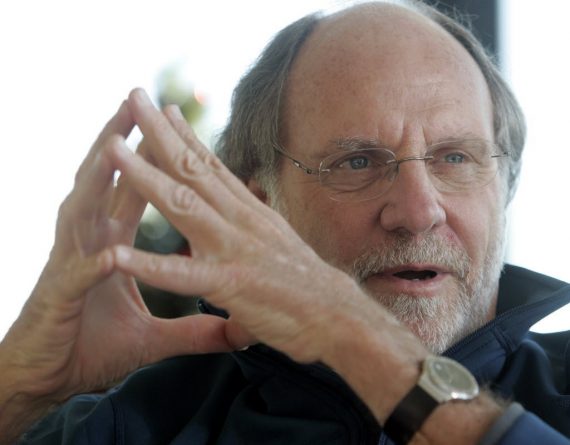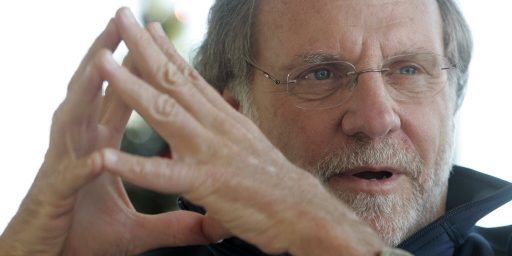Jon Corzine To Tell Congress: “I Simply Don’t Know Where The Money Is”
Apparently, Jon Cozrine’s primary response to questions regarding the downfall MF Global and the loss of hundreds of millions of dollars in client funds will be roughly similar to the problem Americans have with their car keys on a daily basis:
Jon S. Corzine, the former U.S. senator and New Jersey governor who presided over the collapse of the commodities brokerage MF Global, says he cannot explain what happened to “many hundreds of millions of dollars” that the firm was holding for customers.
In testimony prepared for delivery to Congress Thursday, Corzine says he was “stunned” to learn shortly before the firm sought bankruptcy protection at the end of October that MF Global could not account for the money.
“I simply do not know where the money is, or why the accounts have not been reconciled to date,” the former MF Global chief executive says, according to the testimony.
Regulators pushed MF Global into bankruptcy court on Halloween after an effort to sell the troubled firm unraveled. The firm is now in liquidation.
The firm was required to keep clients’ money separated from its own. But more than $1.2 billion may be missing, the trustee overseeing the firm’s liquidation said last month.
The FBI, the Commodity Futures Trading Commission and other authorities are investigating and have had difficulty figuring out what happened to the missing funds.
Meanwhile, the firm’s collapse has become a major disruption for customers and others who depended on MF Global.
The House Agriculture Committee, whose jurisdiction includes agricultural commodities and one of the federal agencies that regulates MF Global, subpoenaed Corzine to appear at a hearing Thursday on the firm’s bankruptcy. The committee turned down Corzine’s request to testify voluntarily in January, he says.
In his prepared statement, Corzine says that many people in his situation would invoke their Fifth Amendment right to remain silent. However, as a former senator, Corzine says, he recognizes the importance of congressional oversight and believes “it is appropriate that I attempt to respond to your inquiries.”
Though anything he says could be used against him, Corzine hedges his testimony by saying he had too little time to prepare for the hearing and only limited access to records “essential to my being able to testify accurately.”
“I sincerely apologize, both personally and on behalf of the company, to our customers, our employees and our investors, who are bearing the brunt of the impact of the firm’s bankruptcy,” Corzine says.
(…)
In Thursday’s statement, Corzine says that, though he “ultimately had overall responsibility for the firm,” he did not generally involve himself in the movement of cash and collateral or the mechanics of settling trades.
“Nor was I an expert on the complicated rules and regulations governing the various different operating businesses that comprised MF Global,” he says.
From a public relations point of view, I’m not sure pleading ignorance is the best way to go. It’s also not exactly a defense to any potential criminal actions that Corzine might be subject to in the future. Which is why the fact that he is even testifying to begin with surprises me. The most obvious charge that Corzine opens himself up to today is perjury. As Roger Clemens is learning, any discripency between what he says under oath and what the investigation revealed could be a problem for him.





To be fair, who hasn’t misplaced $100 million at least once in their life? You know how it is. You go to the bars for a night out with friends. You think you only spend $50, but the next morning you wake up and check your wallet and you’ve actually spent $100,000,000.
Happens all the time.
It’s the Enron defense: yes, this was my responsibility, but I was simply too stupid to know what was going on.
What’s really scary is that in ’09 over a million Zombiebots in New Jersey voted to re-elect Corzine as their governor.
A-yup. Whether he was or was not “…an expert on the complicated rules and regulations governing the various different operating businesses that comprised MF Global,” he was the boss. He had fiduciary responsibilities that he just publicly admitted he did not carry out. IANAL, but it looks strongly like this testimony clearly opens him up for civil liability and possible criminal prosecution. I can only assume that he’s under the impression that testifying for Congress like this makes him immune from later legal actions…
@legion: Do we know that Congress didn’t offer him immunity to testify?
My cynical self says that it wouldn’t be surprising for Congress to provide cover for its own.
@Stormy Dragon:
Stormy, there’s a difference between now and then. When the “smartest guys in the room” at Enron did what they did and denied knowing anything about it, ignorance of what was being done wasn’t against the law. It is now and the irony, as I pointed out in my post today, is that Jon Corzine voted to make it illegal.
Maybe he can sit in a jail cell and think about where it went.
@Dave Schuler:
The Enron defense isn’t about making a valid legal defense. It’s like the Chewbaca defense where the goal is just to confuse enough jurors to get an acquittal.